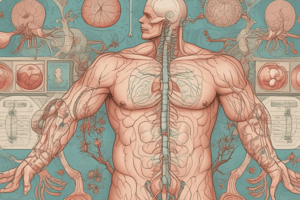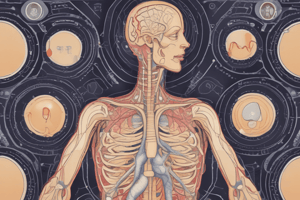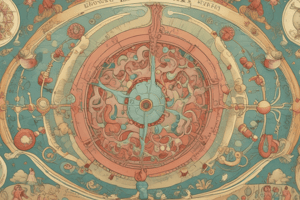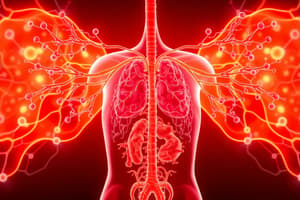Podcast
Questions and Answers
What is the primary function of hormones in the human body?
What is the primary function of hormones in the human body?
- To coordinate various functions in the body (correct)
- To fight off infections
- To regulate muscle contractions
- To produce energy for the body
Which hormone is responsible for promoting growth and development in children and adolescents?
Which hormone is responsible for promoting growth and development in children and adolescents?
- Insulin
- Growth hormone (GH) (correct)
- Cortisol
- Glucagon
What is the role of hormones in regulating metabolism?
What is the role of hormones in regulating metabolism?
- To break down proteins
- To regulate blood pressure
- To regulate energy production from food (correct)
- To regulate body temperature
What is the primary role of hormones in sexual function and reproduction?
What is the primary role of hormones in sexual function and reproduction?
Which hormone is involved in regulating mood and emotional responses?
Which hormone is involved in regulating mood and emotional responses?
What triggers the production and release of hormones in the human body?
What triggers the production and release of hormones in the human body?
What is the function of thyrotropin-releasing hormone (TRH) in the hypothalamic-pituitary-thyroid axis?
What is the function of thyrotropin-releasing hormone (TRH) in the hypothalamic-pituitary-thyroid axis?
What is the role of corticotropin-releasing hormone (CRH) in the hypothalamic-pituitary-adrenal axis?
What is the role of corticotropin-releasing hormone (CRH) in the hypothalamic-pituitary-adrenal axis?
What is the effect of an underactive thyroid gland (hypothyroidism) on the body?
What is the effect of an underactive thyroid gland (hypothyroidism) on the body?
What is the function of hormone replacement therapy (HRT) in treating hormone deficiencies?
What is the function of hormone replacement therapy (HRT) in treating hormone deficiencies?
What is the effect of endocrine disrupting chemicals (EDCs) on hormone production and function?
What is the effect of endocrine disrupting chemicals (EDCs) on hormone production and function?
What is the role of leptin in the body?
What is the role of leptin in the body?
Flashcards are hidden until you start studying
Study Notes
Hormones are chemical messengers that play a crucial role in coordinating various functions in the human body. They are produced by specialized cells called endocrine cells, which are found in glands and organs such as the pituitary, thyroid, adrenal glands, pancreas, and gonads (testes and ovaries). Hormones travel through the bloodstream to target cells, where they interact with specific receptors and trigger a cascade of biochemical reactions that modify the cell's function or activity.
Hormone Functions
Hormones are involved in several essential bodily processes, including:
-
Growth and Development: Hormones like growth hormone (GH) and insulin-like growth factor 1 (IGF-1) are crucial for promoting growth and development in children and adolescents.
-
Metabolism: Hormones like insulin, glucagon, and cortisol help regulate the body's metabolism, ensuring that the body gets the energy it needs from the food it consumes.
-
Sexual function and Reproduction: Hormones such as testosterone, estrogen, and progesterone play a significant role in sexual function and reproduction in both males and females.
-
Mood regulation: Hormones like cortisol and dopamine are involved in regulating mood and emotional responses.
Hormone Production and Release
Hormones are produced and released by endocrine glands and organs in response to specific stimuli. For example, the pituitary gland releases growth hormone-releasing hormone (GHRH) and somatostatin, which together regulate the release of growth hormone. The thyroid gland produces thyroid-stimulating hormone (TSH), which stimulates the release of thyroid hormones like triiodothyronine (T3) and thyroxine (T4).
In addition to these glands, other organs like the pancreas and adipose tissue also produce and release hormones. The pancreas produces insulin and glucagon, which regulate blood sugar levels, while adipose tissue produces leptin, which helps regulate appetite and energy balance.
Hormone Interactions and Communication
Hormones work together in complex systems to coordinate bodily functions. For example, the hypothalamic-pituitary-adrenal (HPA) axis is a neuro-endocrine system that regulates the body's stress response. The hypothalamus releases corticotropin-releasing hormone (CRH), which stimulates the pituitary gland to release adrenocorticotropic hormone (ACTH). ACTH then stimulates the adrenal glands to release cortisol, which helps the body respond to stress.
Hormones can also interact with the nervous system. For example, neurotransmitters like dopamine can act as hormones by regulating metabolism and mood.
Hormone Imbalances and Disorders
Hormone imbalances can lead to various health problems. For example, an overactive thyroid gland (hyperthyroidism) can cause rapid heartbeat, weight loss, and anxiety, while an underactive thyroid gland (hypothyroidism) can lead to fatigue, weight gain, and depression. Similarly, imbalances in sex hormones like testosterone and estrogen can cause fertility problems or hormone-related cancers.
Hormone Replacement Therapy and Hormone-Modulating Drugs
In some cases, hormone replacement therapy (HRT) may be used to treat hormone deficiencies. HRT can help alleviate symptoms of menopause, such as hot flashes and vaginal dryness, by administering estrogen. Hormone-modulating drugs like glucocorticoids can be used to treat conditions like rheumatoid arthritis and asthma by reducing inflammation and suppressing the immune system.
Endocrine Disrupting Chemicals
Exposure to certain chemicals, known as endocrine disrupting chemicals (EDCs), can interfere with hormone production and function. EDCs can mimic or block the action of hormones, leading to health problems like developmental disorders and reproductive issues.
In conclusion, hormones are essential chemical messengers that play a crucial role in coordinating various functions in the human body. They are produced by endocrine glands and organs and interact with the nervous system to maintain homeostasis. Imbalances in hormone levels can lead to various health problems, while hormone replacement therapy and hormone-modulating drugs can be used to treat hormone deficiencies. Additionally, exposure to endocrine disrupting chemicals can have detrimental effects on hormone function.
Studying That Suits You
Use AI to generate personalized quizzes and flashcards to suit your learning preferences.




